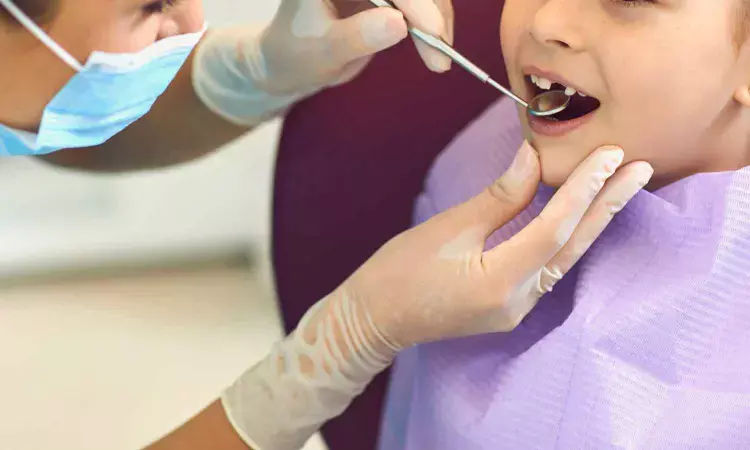- Home
- Medical news & Guidelines
- Anesthesiology
- Cardiology and CTVS
- Critical Care
- Dentistry
- Dermatology
- Diabetes and Endocrinology
- ENT
- Gastroenterology
- Medicine
- Nephrology
- Neurology
- Obstretics-Gynaecology
- Oncology
- Ophthalmology
- Orthopaedics
- Pediatrics-Neonatology
- Psychiatry
- Pulmonology
- Radiology
- Surgery
- Urology
- Laboratory Medicine
- Diet
- Nursing
- Paramedical
- Physiotherapy
- Health news
- Fact Check
- Bone Health Fact Check
- Brain Health Fact Check
- Cancer Related Fact Check
- Child Care Fact Check
- Dental and oral health fact check
- Diabetes and metabolic health fact check
- Diet and Nutrition Fact Check
- Eye and ENT Care Fact Check
- Fitness fact check
- Gut health fact check
- Heart health fact check
- Kidney health fact check
- Medical education fact check
- Men's health fact check
- Respiratory fact check
- Skin and hair care fact check
- Vaccine and Immunization fact check
- Women's health fact check
- AYUSH
- State News
- Andaman and Nicobar Islands
- Andhra Pradesh
- Arunachal Pradesh
- Assam
- Bihar
- Chandigarh
- Chattisgarh
- Dadra and Nagar Haveli
- Daman and Diu
- Delhi
- Goa
- Gujarat
- Haryana
- Himachal Pradesh
- Jammu & Kashmir
- Jharkhand
- Karnataka
- Kerala
- Ladakh
- Lakshadweep
- Madhya Pradesh
- Maharashtra
- Manipur
- Meghalaya
- Mizoram
- Nagaland
- Odisha
- Puducherry
- Punjab
- Rajasthan
- Sikkim
- Tamil Nadu
- Telangana
- Tripura
- Uttar Pradesh
- Uttrakhand
- West Bengal
- Medical Education
- Industry
Buccal and Intranasal Midazolam Effective for Managing Uncooperative Children in Dental Treatment: Study

Researchers have found in a new research that both buccal (85%) and intranasal (80%) midazolam proved effective in calming uncooperative children during dental procedures.
Behavioral management techniques are not always sufficient, and then it is necessary to use pharmacological management methods.
The aim of this study is to compare the effectiveness of buccal midazolam sedation with intranasal midazolam in non-cooperative children during dental treatment. A randomized single blinded comparative clinical study consisted of 40 children aged 3–6 years who were divided randomly into two groups: Group A intranasal midazolam and Group B buccal midazolam.
The onset time of action and recovery time from sedation were compared between the two groups, and the efficacy of sedation was evaluated by Houpt behavior scale. The independent student’s T test, Mann–Whitney U test, the Wilcoxon test and the Chi-square test were used. Results: There were no statistically significant differences in the onset time of action (p = 0.458) and recovery time from sedation (p = 0.148). There were no statically significant differences between the two groups in sleeping, crying, and movement categories (p = 0.747), (p = 0.183), (p = 0.732), respectively, or in the overall Houpt scale (p = 0.393), there were statistically significant differences in the sleep variable between the two studied phases in the intranasal group (p = 0.014) and in the movement variable in the buccal group (p = 0.039).
Both buccal midazolam and intranasal sedation were effective in the management of uncooperative children during dental treatment at 85% and 80%, respectively.
Reference:
Arnaout, Doaa, Altinawi, Mohamed, Katbeh, Imad, Tuturov, Nikolay, Saleh, Ahmad, Evaluation of the Efficacy of Buccal Midazolam in Comparison With Intranasal Midazolam Sedation in Uncooperative Children During Dental Treatment, International Journal of Dentistry, 2025, 4269519, 6 pages, 2025. https://doi.org/10.1155/ijod/4269519
Dr. Shravani Dali has completed her BDS from Pravara institute of medical sciences, loni. Following which she extensively worked in the healthcare sector for 2+ years. She has been actively involved in writing blogs in field of health and wellness. Currently she is pursuing her Masters of public health-health administration from Tata institute of social sciences. She can be contacted at editorial@medicaldialogues.in.
Dr Kamal Kant Kohli-MBBS, DTCD- a chest specialist with more than 30 years of practice and a flair for writing clinical articles, Dr Kamal Kant Kohli joined Medical Dialogues as a Chief Editor of Medical News. Besides writing articles, as an editor, he proofreads and verifies all the medical content published on Medical Dialogues including those coming from journals, studies,medical conferences,guidelines etc. Email: drkohli@medicaldialogues.in. Contact no. 011-43720751


